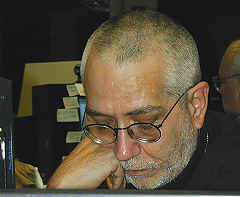
Phillip Blanchard
Hacks
L was a superb city editor in his day. When I was a “cub reporter,” he watched as I hyperventilated about the difficult logistics of covering a big fire. “What’s my deadline? What if there’s no phone? What if the chief won’t talk to me? Will I have enough time to talk to the neighbors? What if they don’t let my car through the lines?” I prattled.
“Just cover the damn fire,” L told me. He had little patience for major productions. I learned a lot from him.
Fourteen years later, when I returned to L’s newspaper as a copy editor and slot man, I was at first delighted to find him on the copy desk. What a font of information, I thought. How lucky it was that the reporters of 1986 had such a resource from which to draw.
But L was just marking time. He came in at 5 every day, sat down and plowed through whatever was tossed his way, quickly and without comment. His copy editing was competent but just barely so. His headlines were serviceable but nothing better. He went home for lunch at mid-shift every night and came back carrying bad novels to read during his down time and, also, a hint of the Scotch he professed to love so well.
My first role model had become a hack.
L retired a couple of years after I left the paper for Chicago, and died not long after that.
Throughout my career I have encountered hacks. Most of them were personable. Most of them went through the ritual of juggling eyeglasses with various prescriptions so they could read copy on their VDTs. A good number of them were drunks or reformed drunks.
Almost all of them were frank about their ambition: They had none. They talked a lot about retirement, and most of them had hobbies or other avocations that they clearly cared about more than they did newspaper work.
They generally could be depended upon to move copy quickly. Usually one of them was the guy who got the Page One story that moved an hour and half past deadline, because he (exclusively, the hacks I knew were men) would fix the spelling and write a usable headline in no time.
We could always go back between editions and do it right.
As I approach the age of 50, hacks are on my mind because of a dreadful fear of becoming one. In my more rational moments, I realize that while I may, regrettably, have become mildly eccentric in my middle age, I would have to slide considerably to become a hack. (Most hacks are eccentric, but not all copy-desk eccentrics are hacks.) It is true that I have to go through the eyeglass-fumbling ritual when I arrive at work, but I can’t be blamed for failing eyesight.
My strategy for avoiding hackdom is simple: I try to remain engaged. In previous positions, that was not a problem; as what might be laughingly called a “key” editor, I had specific responsibilities for entire sections of the newspaper.
Now, as a “pure” copy editor, I find it necessary to stick my nose into other people’s business to maintain the level of engagement I require to stay reasonably sharp. No doubt others find this annoying at times, but I am willing to accept that judgment if it helps me avoid obsession with fly-fishing, building a vacation home, or investing to finance a “comfortable retirement”—a term I consider oxymoronic.
--Phillip Blanchard